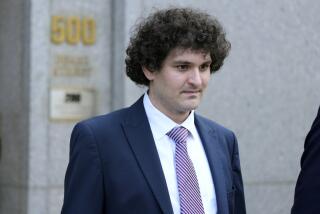The SEC’s $50-billion Madoff lesson
- Share via
The alleged $50-billion swindle by broker-dealer Bernard L. Madoff has rocked investors like nothing since the epic Enron securities fraud. But while the Enron debacle pointed out holes in the regulatory fabric, the Madoff case appears to have been a failure to enforce the laws already on the books. We look forward to an investigation into why the Securities and Exchange Commission whiffed on at least two swings at Madoff’s operation, which he reportedly has acknowledged was a Ponzi scheme in the guise of a sophisticated trading strategy. But more than that, we hope the Obama administration will bring a more workable approach to securities law -- one that relies on simpler, clearer rules that are better enforced.
Madoff had two main lines of business: His firm was a “market maker,” a securities middleman that helps the public buy and sell shares of stock, and he managed an investment fund that was open to a relatively small number of clients. In the former he was subject to the rules adopted and enforced by securities dealers themselves, in addition to federal laws. As an investment advisor, though, he was off the SEC’s radar screen because he didn’t offer services to the public. With concern rising about hedge funds, the SEC adopted a new rule that forced Madoff (and many hedge-fund advisors) to register with the government in 2005. (An appeals court threw out the rule the following year.)
As a new registrant, Madoff’s investing activities should have been given the once-over by the SEC that year. But the agency didn’t scrutinize his books because it judged him to be low risk -- despite the fact that he was managing billions of dollars worth of assets. What’s worse, years before he registered as an investment advisor, the SEC had received multiple allegations of fraud by Madoff. The SEC inspector general is now trying to figure out why those complaints went nowhere. Sadly, it was just a few years ago that the SEC belatedly unearthed another Ponzi scheme: the Bayou Management scam, which seemed huge at the time but cost investors less than 1% of what Madoff is accused of flushing.
There are at least three lessons here. One is that the SEC and the securities dealers’ self-regulatory group should be more rigorous in their approach to companies entrusted with billions of dollars in assets. Second, investment firms with significant assets should be required to use independent custodians to hold their assets and make trades. Such a simple, bright line would make it harder to perpetrate fraud even when regulators are asleep at the switch -- or hindered by a conflict of interest. And third, investors have to protect themselves by using some common sense. It’s financial gospel that no one makes a profit in the markets each and every year. Anyone who claims such powers should be viewed with the same suspicion as poker players who never lose.
More to Read
A cure for the common opinion
Get thought-provoking perspectives with our weekly newsletter.
You may occasionally receive promotional content from the Los Angeles Times.










